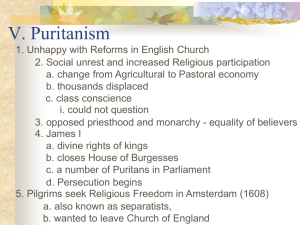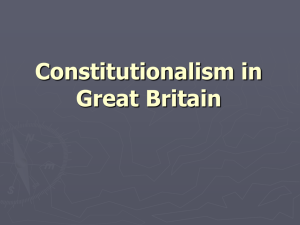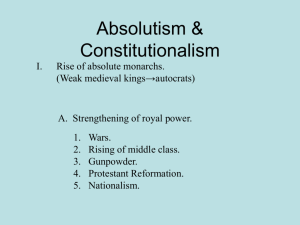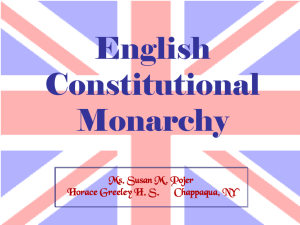Tudors and Stuarts
advertisement
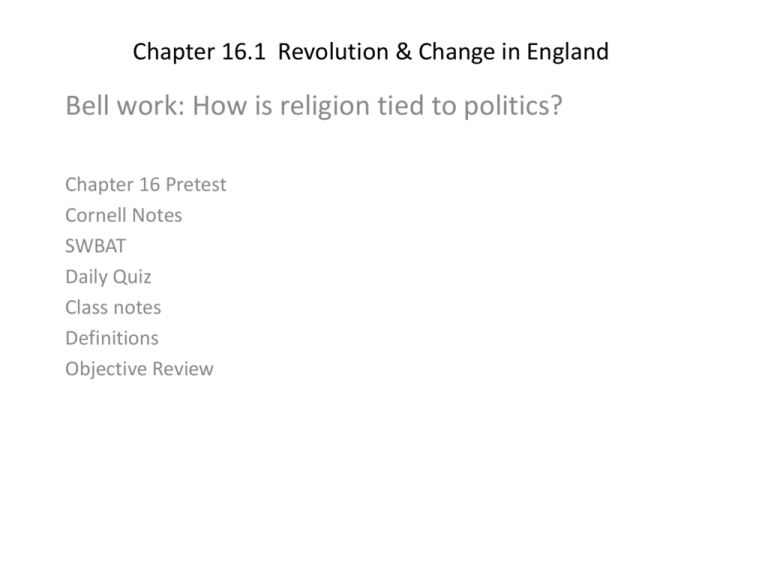
Chapter 16.1 Revolution & Change in England Bell work: How is religion tied to politics? Chapter 16 Pretest Cornell Notes SWBAT Daily Quiz Class notes Definitions Objective Review 16.1 Vocab Define: • • • • revolution gentry burgesses covenant English Channel English Constitutional Monarchy Background (1215-1603) Model Parliament, 1295 Magna Carta,1215 King Edward I brought his military King John I forced to accept it. A list of demands made by the nobility. Created a CONTRACT between the king and the aristocracy. Established principles which limited the power of the king: Established basic legal rights. The king must ask for popular consent for taxes. leaders and nobility together as a Parliament to ask their consent to new taxes. Established the principle of parliamentary “power of the purse.” A radical new idea for any monarch to ask for anything! Accused must have jury trial. The Elizabethan “Bargain” aParliament: Would have the power to tax. Can debate and amend disputed bills. aThe Monarch: Had the royal perogative [right/choice] on foreign policy. Tudors & Stuarts & the issue of Religion Monarch How He/She Dealt with Religious Issues Henry VIII Established Anglican Church after breaking with the Catholic pope Mary I Wanted to restore Catholicism to England; was called “Bloody Mary” when she had Protestant dissenters burned at the state. Elizabeth I Strengthened Protestantism by making those who did not attend the Anglican Church pay fines Mary Queen of Scots Plotted to kill Elizabeth I and rule England as a Catholic nation; was caught and beheaded. Philip II Husband of Mary I who invaded England in an effort to force a Catholic ruler on the English people. James I Supported the Anglican Church & had little tolerance for Puritan’s demands for reform; authorized the king James Version of the Bible Charles I Married a French Catholic princess, which alienated him from the people; advocated formal Catholic-like practices in the Anglican Church, prompting Puritan opposition & Scottish rebellion. The Early Stuarts (1603-1649) James I & Charles I The Stuart Monarchy James I [r. 1603-1625] a a He alienated the Puritans by his strong defense of the Anglican Church. Many of England’s gentry [mostly rich landowners below the level of the nobility] became Puritans. These Puritan gentry formed an important and large part of the House of Commons. It was NOT WISE to alienate them! James I [r. 1603-1625] a Problems he faced: Large royal debt. He wasn’t English he didn’t understand English customs [esp. English law!] Believed in Divine Right of Kings. Pro-Catholic sympathies. Clashed with Parliament He raised money without Parliament’s consent! Gunpowder Plot, 1605 a a Guy Fawkes An attempt by some provincial Catholics to kill King James I and most of the Protestant aristocracy. Blow up the House of Lords during the state opening of Parliament. King James Bible, 1611 Charles I [r. 1625-1649] a a Pro-ceremonies and rituals. Uniformity of church services imposed by a church court. Anglican Book of Common Prayer for both England AND Scotland. a Seen as too proCatholic by the Puritans. Charles I & Parliament a Constantly at war with Spain and France. Always need £, but how to get it?? a Usually Parliament would give Charles £ from taxes to fund his wars. a Periodically, Parliament would deny funds. In return, Charles would dissolve Parliament and try to rule England without it find funds in other ways. Forced “loans,” selling aristocratic titles, etc. The “Short” Parliament a “Short Parliament” No Parliament in 20 yrs. Rebellion in Scotland over Laud issues. Charles need £ war with France. a Calls Parliament into session in 1640 MPs demand more protection of property. Charles dismisses them after 3 weeks. Charles I by Van Dyck (1633) The “Long” Parliament a In session from 1640 to 1660. Laud executed. Triennial Act passed Parliament must be called in session at least once every 3 yrs. Parliament can’t be adjourned without its own consent! a a Charles enters the House of Commons to end the session and arrest 5 MPs unsuccessful Charles heads north to form an army! 16.1 Review Q’s 1. The defeat of the Armada in 1588 began the decline of the sea power of (a) England. (b) Spain. (c) the Netherlands. (d) France. 16.1 Highly moral people who became increasingly unhappy over the practices of the Anglican Church and the quality of the clergy were called (a) Whigs. (b) Tories. (c) Puritans. (d) Presbyterians. 16.1 The Presbyterian Church was established by the (a) English. (b) Irish. (c) Scots. (d) Dutch. 16.1 The Puritans became increasingly unhappy about the (a) practices of the Anglican Church. (b) lack of formalities and rituals in the church. (c) increase in taxes proposed by Charles I. (d) growth of Protestantism in England.

